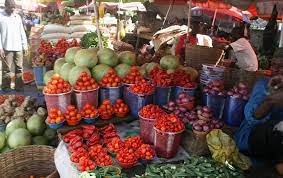By Jeph Ajobaju, Chief Copy Editor
Staple foods such as rice, eggs, tomatoes, and yam rose in prices in April despite a 0.91 month-on-month (MoM) dip in food inflation sub-index, and the fact the overall economy grew 0.5 per cent in the first quarter of 2021 (Q1 2021).
Fares for bus, air, motorcycle, and waterway journeys also jumped despite a 4 per cent drop in petrol pump price, according the latest data released by the National Bureau of Statistics (NBS).
“Selected food price watch data for April 2021 reflected that the average price of one dozen of agric eggs medium size increased year-on-year (YoY) by 11 per cent and MoM by 1.13 per cent to N530.40 in April 2021 from N524.47 in March 2021.
“The average price of agric eggs medium size (price of one) increased YoY by 18 per cent and MoM by 1.5 per cent to N49.14 in April 2021 from N48.43 in March 2021,” the NBS said.
“The average price of 1kg of tomato increased YoY by 0.09 per cent and MoM by 3.7 per cent to N277 in April 2021 from N267 in March 2021.
“The average price of 1kg of rice (imported high quality sold loose) increased YoY by 14.6 per cent and decreased MoM by 0.67 per cent to N540 in April 2021 from N544 in March 2021.
“The average price of 1kg of yam tuber increased YoY by 9.9 per cent and MoM by 3.3 per cent to N252.80 in April 2021 from N244.82 in March 2021.”
But in its inflation report, the NBS explained that the food sub-index declined 0.91 per cent MoM to 0.99 per cent in April from 1.9 per cent in March.
It said fare paid by commuters for bus journeys within the city rose 2.34 per cent MoM to N386 in April 2021 from N377 in March 2021.
Fare paid by passengers for bus journey intercity increased 1.5 per cent MoM to N2,446 in April from N2,411 in March.
Fare paid by commuters for journeys by motorcycle per drop notched1.8 per cent MoM to N276 in April from N271 in March.
Fare paid by passengers for waterway passenger transport increased 1.5 per cent MoM to N820 in April from N808 in March.
The fare increases run contrary to the average pump price of premium motor spirit (PMS), also known as petrol, which the NBS reported decreased MoM by 3.65 per cent to N166.38 in April 2021 from N172.68 in March 2021.
Fare paid by air passengers for specified routes single journey slashed 0.24 per cent MoM to N36,409 in April from N36,495 in March, the NBS said.
Economy lifts 0.5%
Rising food prices emerged even as the economy grew 0.5 per cent Q1 2021 through both higher oil production and prices as activities gradually pivot to pre-pandemic levels after crippling lockdowns.
Nigeria exited its second recession since 2016 in the fourth quarter, despite a full-year contraction in 2020.
The biggest economy in Africa had been grappling with low growth before coronavirus triggered a recession and created large financing gaps, including dollar shortages and inflation.
“The Q1 2021 growth rate was slower than the 1.87 per cent growth rate recorded in Q1 2020 but higher than 0.11 per cent recorded in Q4 2020, indicative of a slow but continuous recovery,” the NBS said in its latest published data.
Nigeria is inoculating its 200 million citizens, but last month directed its regions to stop giving first doses of AstraZeneca vaccines once they use half their current stock, to safeguard supply for a second dose.
Performance by sector
Non-oil sector, which Abuja is trying to make the main growth sector, rose 0.79 per cent in Q1 2021, according to the NBS. Telecoms, crop production, real estate, food manufacturing and construction lifted growth in the quarter.
Per Reuters, crude prices rose above $70 per barrel (pb) on May 19 but later fell on renewed demand concerns as COVID-19 cases in Asia rose and fears that rising inflation might lead the United States Federal Reserve to raise rates, which could limit growth.
Oil, which accounts for two-thirds of Nigeria’s revenue and 90 per cent of foreign exchange, contracted 2.21 per cent in the first quarter as crude production rose to 1.72 million barrels per day (bpd) from Q4 2020.
With weak growth, few expect the Central Bank of Nigeria (CBN) to alter interest rates, Reuters says.
The CBN has pursued an accommodative stance by leaving interest rates on hold. However, dollar shortages have stoked inflation to a more than for-year high, while a shrinking labour market and mounting insecurity pressure households.
“While this points to the likelihood of firmer growth from the second quarter, it still does not allow for a more robust policy response to inflationary pressures,” Razia Khan, chief economist for Africa and the Middle East at Standard Chartered, said.




